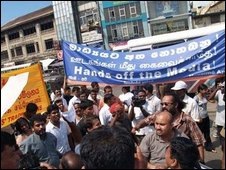 The murder of Sri Lankan newspaper editor Lasantha Wickramatunga highlights the claim often made by human rights groups that the country is one of the most dangerous places in the world for journalists to operate.
The murder of Sri Lankan newspaper editor Lasantha Wickramatunga highlights the claim often made by human rights groups that the country is one of the most dangerous places in the world for journalists to operate.
He is the latest in a long line of Sri Lankan journalists who have been murdered or silenced over the past two decades.
Many of the victims have not met their fate in the country’s war zone, because for much of the past 20 years independent journalists have been banned from reporting from the conflict areas.
Instead they have been targeted in Colombo – and nearly all of them had records of exposing official corruption or what they said was inept handling of the war against the Tamil Tiger rebels.
The war now appears to be reaching its final, crucial stage as the army continues to make in-roads into the rebels’ northern stronghold.
‘Iconoclastic journalist’
"Mr Wickramatunga’s death is a serious blow for press freedom because he was one of the few reporters in the country who could write authoritatively about the government and Tamil Tigers’ conduct of a brutal war which has claimed thousands of lives over the years but has been consistently under-reported by much of the world’s media," said Priyath Liyanage, editor of the BBC’s Sinhala service.
Campaigning groups such as Reporters Without Borders say that the targeting of journalists has worsened in recent years. Only on Tuesday, gunmen armed with grenades ransacked offices of the largest private TV broadcaster in the country.
"Sri Lanka has lost one of its more talented, courageous and iconoclastic journalists," a Reporters Without Borders statement said.
"President Mahinda Rajapaksa, his associates and the government media are directly to blame because they incited hatred against him and allowed an outrageous level of impunity to develop as regards violence against the press. Sri Lanka’s image is badly sullied by this murder, which is an absolute scandal and must not go unpunished."
Amnesty International last year said that at least 10 media workers were killed over a two-year period. It said that many more were abducted, detained or had disappeared.
Last month Human Rights Watch called on the government to free prominent Tamil journalist, JS Tissainayagam. His magazine accused the government of "shamefully using anti-terror laws to silence peaceful critics".
Criminal libel
One of those reporters who steadfastly refused to be silenced was Lasantha Wickramatunga. A flamboyant and colourful character, he was not afraid to expose the perceived wrongdoings of the country’s most influential politicians.
I interviewed him in Colombo in 2000, when his paper was closed down because it mockingly avoided censorship regulations by reporting the opposite of what had really happened.
At that time the army was in retreat and the northern Jaffna peninsula was close to falling to the Tigers. The paper avoided the censor by reporting that Jaffna was safe in the government’s hands and that the army was on the offensive.
On another occasion Mr Wickramatunga obtained the credit card details of a government minister to show that his bills were being illegally paid for by a foreign company eager to invest in the country.
While some of the material Mr Wickramatunga produced arguably veered towards the prurient, his "publish and be damned" attitude to journalism meant that at times he was able to expose high-profile cases of government corruption which meant that he received numerous death threats and several periods of detention.
(For updates you can share with your friends, follow TNN on Facebook and Twitter )
